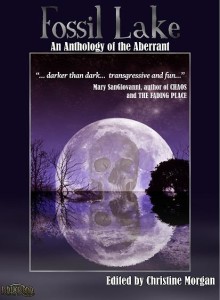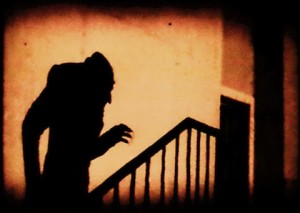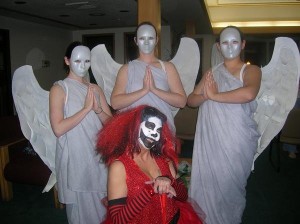As a token of appreciation for our readers and fans, we present a series of flash fiction stories to entertain and scare you. We hope you enjoy them, as does that ghostly figure reading this over your shoulder…
Steaks
Guy Anthony De Marco
Bob hated driving ‘cattle’ trucks. He liked the cargo, but the other drivers drove him mad. Soccer moms cutting him off on their way to the hairdressers and belligerent teenagers flipping him off all contributed to Bob’s loathing of city dwellers. He held his tongue for years, biding his time.
On Bob’s final run, the day he’d retire, he made a detour towards the old Quonset hut on his property. He would butcher and freeze this load to keep him in steaks for months, maybe years.
As he turned the crowded schoolbus into his driveway, he began to drool.
Once in a Lifetime Opportunity
Pamela K. Kinney
“Want a unique experience?” asked the woman in a tight mini dress and stiletto heels.
The man grinned. “What do you have in mind?”
“Something I know you never had done to you before and can only be done once.”
He followed her down an alley. They stopped beneath a sickly yellow light.
The man said, “I’ve done every sexual position you can imagine.”
“This is not about sex.”
The prostitute vanished, replaced by a monster. Before he could escape, it ate him.
Costumed as the human woman again, the monster patted her belly. “Now, you experienced being my meal.”
Troubles
Guy Anthony De Marco
“All right, you horrible jerk.”
The Mrs. is pissed off at me again. I rack my brain, trying to think of what she could have discovered. My mistress died suddenly, so she couldn’t have squealed about our affair. Nobody saw me hit the crippled guy with my car last year.
She’s not crying, so it has nothing to do with the jerk she was having an affair with while I was at work. I killed him too.
“Okay, I give. What did I do this time?”
She held up a severed, partially gnawed woman’s hand.
“I thought you were on a diet, dear?”
Trick Or Treat
Frank Morin
He hated Halloween, with all those grasping, selfish children.
This year he prepared a special treat. The children would gobble them down, not even tasting the ricin. They’d die painfully in a few days, and no one could ever trace the source of the deadly toxin back to him.
Halloween night, he hosted a party of dear friends, but when he went to fetch the bowl of poisoned chocolate, he found it filled with different candy.
His wife called, “Give the brats the cheap stuff.”
“Where are my chocolates?”
“Gone,” she laughed. “They were the hit of the party.”
After the Crossroads
Mary Pletsch
I am sorry, my friend…but you are a mother too. You will understand—I couldn’t leave my daughter alone. You often said how you couldn’t comprehend what I was going through, watching my little girl wither away.
You would not have laughed at me if I had told you that in my desperation I had gone down to the crossroads with four black candles and a Club Pack of chicken breasts, $4.99 per pound on sale. You would not have made fun of my sacrifice. You would have known that even at that price, I would be skipping meals for the rest of the week.
You, if anyone, would have held my hand as I invoked Him. You would have reassured me. You would have told me there was no fault in trying.
The next morning my daughter drank from the bottle He gave me in exchange for the soul of the head of the house. My friend, I am so sorry… On my way to the hospital I walked past my own door and drew the mark on yours.
I will watch over your sons as you would have watched over my daughter, had the situation been reversed.
Vultures
Guy Anthony De Marco
The lines were longer than expected. It took a while to dock with the geosynchronous auction house, where robotic transports shuttled bidders to the main deck. The inner wall of the doughnut-shaped vessel displayed flashes of upcoming items; the outer gave the occupants a view of incoming ships.
Hun-Rey appreciated the attention to detail provided by the auctioneers. Disposable holo-vids of the major pieces, organic foods, and many intoxicating beverages — the house expected to pull in big numbers.
Most of the elite stopped by, pumping each other for inside information. Hun-Rey greeted each one, and divulged misinformation with a smile. He was a professional, a bidder with clairvoyance and charm.
A small bell tolled three times, and the auction began.
“Today we have a rarity. One certified dead world, with many antiquities intact. We will start with item one, a tubular underwater vehicle with all sixteen nuclear weapons unfired…”
Leftovers
Kristin Luna
The tabby strolled down the steps, weaving between the banisters. She hadn’t been fed for days, and her short hair began to suck to her body to display her ribs.
When she reached the ground level of her domicile, she peered into the kitchen and sat on her haunches. She stared at her owners sitting still in their chairs. She approached the youngest one that usually had bits of leftover breading from chicken fingers or cheese or cookie bits stuck to her fingers. She smelled the little fingers, but there was only the smell of acrid pickles. All the same, she rubbed against the little fingers and the rope end that dangled from the girl’s wrists.
She quickly passed by the one with the slick, black shoes that kicked her often and went straight for the one in the slippers and nightgown who poured her cat food every morning. She rubbed against the slippered feet, but again, was given no pats or rubs in return.
Demanding as she was, the feline jumped up to the table, as the action demanded attention in the past. But no one batted her away or placed her back down on the floor. Her presence unprotested, the cat sniffed a puddle of a strange liquid, and paused. She looked at the pool as if considering. But after a moment had passed, the tabby bent her head farther and drank from it anyway. At first slowly, the reddish brown coagulations catching on her tongue, and the sharp flavor different from water or milk. But the tabby was hungry, and this red milk would have to do.


 Evan Braun is an author and editor who has been writing books for more than ten years. He is the author of The Watchers Chronicle, whose third volume, The Law of Radiance, was released earlier this year. In addition to specializing in both hard and soft science fiction, he is the managing editor of The Niverville Citizen. He lives in Niverville, Manitoba.
Evan Braun is an author and editor who has been writing books for more than ten years. He is the author of The Watchers Chronicle, whose third volume, The Law of Radiance, was released earlier this year. In addition to specializing in both hard and soft science fiction, he is the managing editor of The Niverville Citizen. He lives in Niverville, Manitoba.
